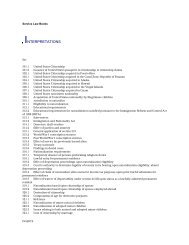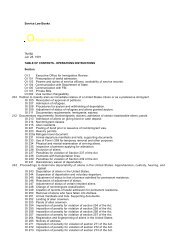You also want an ePaper? Increase the reach of your titles
YUMPU automatically turns print PDFs into web optimized ePapers that Google loves.
<strong>Inspector's</strong> <strong>Field</strong> <strong>Manual</strong><br />
the detention facility or at a location arranged through the asylum office having jurisdiction over the place of<br />
apprehension, depending on location. In some cases, credible fear interviews may be conducted by other<br />
asylum-trained immigration officers. If the alien is determined to have a credible fear of persecution, the asylum<br />
officer will refer the alien for a well-founded fear hearing before an immigration judge under section 240 of the<br />
Act. If the alien is found not to have a credible fear of persecution, following review by a supervisory asylum<br />
officer, the asylum officer will order the alien removed pursuant to section 235(b)(1), unless the alien requests<br />
that the determination of no credible fear be reviewed by an immigration judge. If the alien makes such a<br />
request, the asylum officer will use Form I-863, Notice of Referral to Immigration Judge, checking box #1, to refer<br />
the alien to the immigration judge for review of the credible fear determination. If the immigration judge<br />
determines that the alien does not have a credible fear of persecution, the Service will present the alien for<br />
removal to the carrier on which he or she arrived. There may be some situations where the actual carrier of<br />
arrival and port of embarkation cannot be ascertained. Such cases may require additional processing, including<br />
detention, in order to arrange for travel documents and transportation at government expense (User Fee).<br />
(e) Claim to lawful permanent resident, asylee, or refugee status, or U.S. citizenship. (1) General. Cases in<br />
which an alien who is subject to expedited removal claims to be a U.S. citizen, claims to have been lawfully<br />
admitted for permanent residence, to have been admitted as a refugee under section 207, or to have been granted<br />
asylum under section 208, should be handled very cautiously to ensure that the rights of the individual are fully<br />
protected. The expedited removal authority provided by IIRIRA is a powerful tool and there are significant<br />
interests at issue where such a claim is made. You should be extremely aware of those interests when you are<br />
using this tool. There are grave consequences (for the person involved, for the Service, and for the individual<br />
officer) involved in incorrectly processing a bona fide citizen, LPR, refugee or asylee for removal. Although the<br />
statute and regulations provide certain procedural protections to minimize the risk of such consequences, you<br />
should never process a case for expedited removal which you would not feel satisfied processing for a hearing<br />
before an immigration judge.<br />
If the alien falsely (or apparently falsely) claims to be a U.S. citizen, lawful permanent resident, refugee, or<br />
asylee, and is not in possession of documents to prove the claim, make every effort to verify the alien's claim<br />
prior to proceeding with the case. This can be accomplished through a thorough check of the Service data<br />
systems, manual request to the Records Division, careful questioning of the alien, or review of Service issued and<br />
other documentation presented. Use whatever means at your disposal to verify or refute a claim to U.S.<br />
citizenship, including verification of birth records with state authorities, etc.<br />
(2) Verifiable Claim. When inspecting an alien whose claim to lawful permanent resident status has<br />
been verified, determine whether the alien is considered to be making an application for admission within the<br />
meaning of section 101(a)(13). [See discussion in Chapter 13.4.] Although the lawful permanent resident may<br />
not be considered to be seeking admission, he or she is nonetheless required to present proper documents to<br />
establish his or her status as a lawful permanent resident. If the claim is verified and the alien appears to be<br />
admissible except for lack of the required documents, consider a waiver under section 211(b) for a lawful<br />
permanent resident, or consider accepting an application for a refugee travel document in accordance with 8<br />
CFR 223.2(d)(2)(ii) for a refugee or asylee. Refer to Chapters 13.2 and 17.5 for a discussion of this and other<br />
options for admitting returning residents.<br />
If the claim is verified, but a waiver is not available or is not clearly warranted, such as when fraud was<br />
committed in obtaining status or upon entry, or in cases where the alien appears to have abandoned his or her<br />
residence, you may initiate removal proceedings under section 240 of the Act. Procedures for preparing for<br />
removal hearings and processing inadmissible LPRs are discussed in Chapters 17.6 and 17.10. Although the<br />
charging document, Form I-862, Notice to Appear, is the same for both inadmissible and deportable aliens,<br />
immigration officers performing inspections at a port-of-entry are authorized to issue a Notice to Appear only to<br />
arriving aliens, as defined in 8 CFR 1.1(q). If a lawful permanent resident is not considered to be seeking<br />
admission, he or she is not an arriving alien. If a Notice to Appear is to be issued charging the returning resident<br />
as a deportable alien, the Notice to Appear must be issued by one of the authorizing officers listed in 8 CFR 239.1,<br />
such as the ADDE or ADDI, in accordance with local policy.<br />
(3) No Verifiable Claim. If no record of the alien's lawful admission for permanent residence, grant of<br />
refugee status, admission as an asylee, or citizenship can be found after a reasonably diligent search, advise the<br />
alien that you are placing him or her under oath, or take a declaration as permitted in 28 U.S.C. 1746, and warn<br />
the alien of the penalties for perjury. Section 1746 of the Title 28 United States Code reads as follows:




